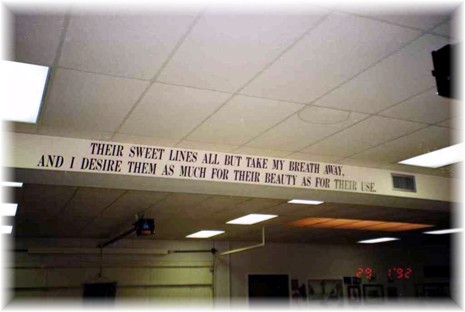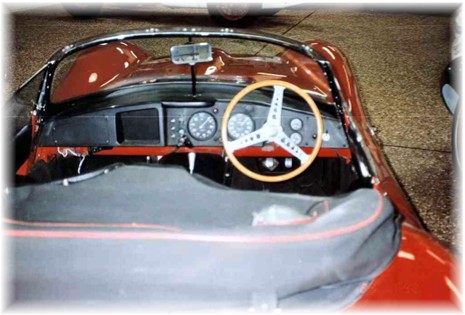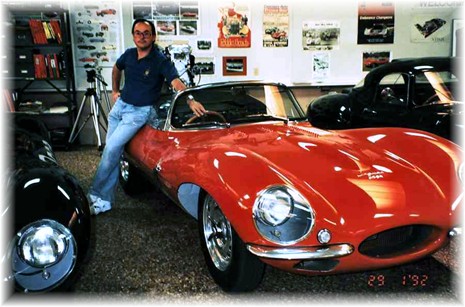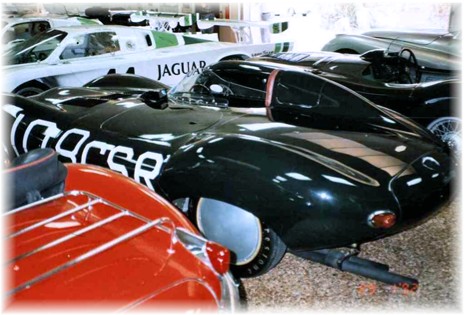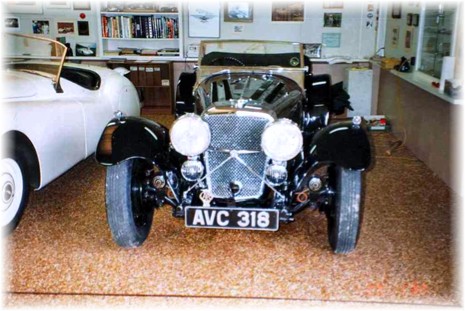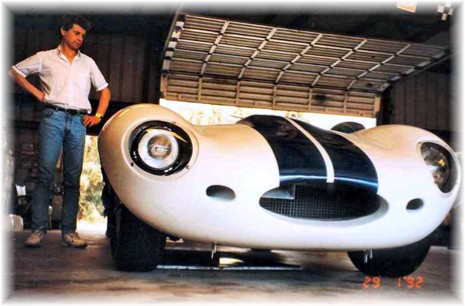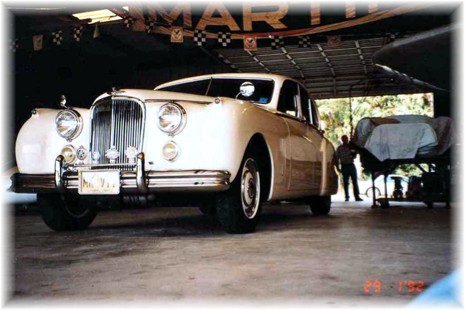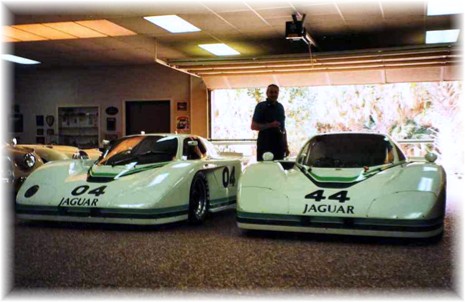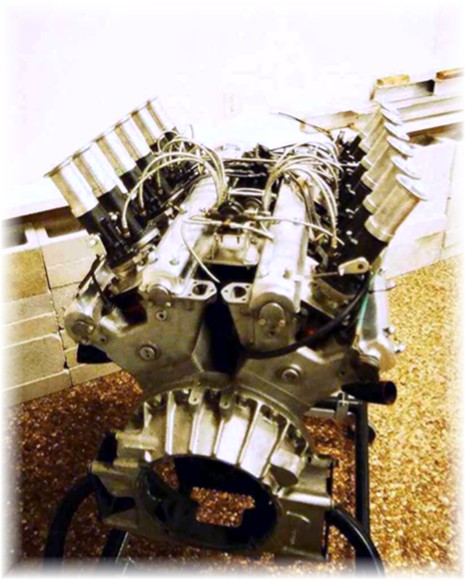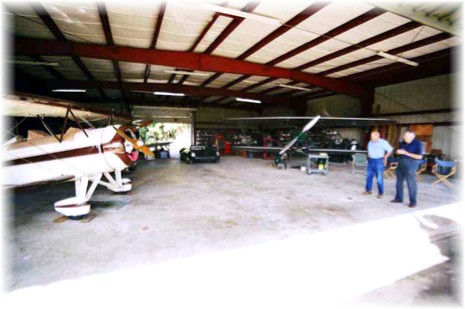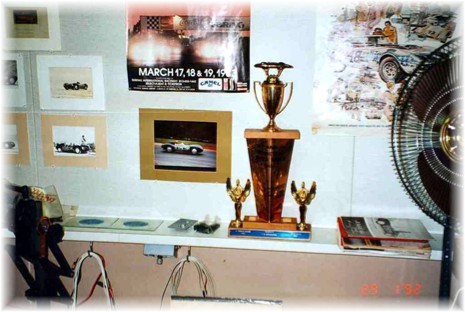The Walter Hill Collection
By Lynxd67
I want you to imagine that one day you open your garage and survey the contents therein, feasting your eyes on cars of which heretofore you have only been able to dream. Amongst the collection first of all you have two of the 16 XKSS’s made by Jaguar, plus so many other important cars that you really cannot believe your eyes. You are the kid who has been given the keys to the candy store! This is what befell us when Walter Hill, that rare American who for many years was so passionate about our marque, opened up his garage for John Burton, George Gibbs and I to see back in February 1992. John and I had gone to see the Daytona 24 hour race, and it was George who kindly introduced us to this wonderful gentleman. The Walter Hill collection of Jaguars was sold last year and cars are appearing on the market all over the world, some sold some not the latter including the lightweight E type and the early chassis no. 27 E type which failed to meets their reserve at Goodwood in September.
Walter’s fascination
with Jaguars dates back to the euphoric age of the 1950’s and he became
determined one day to own an XKSS; his quest for this most rare of Jaguars began
in 1968 with a phone call to his
friend Reggie Smith who said that such things were unobtainable, but Walter
persisted. After a fruitless year’s search he once again phoned Reggie and was
advised that if, a small if at that, such a vehicle was to come on the market it
would probably be advertised in a magazine called Competition Press, something
Walter had never heard of. Walter at this moment was in
So began a
collection that at the time I considered better than that of Jaguar
itself.
Apart from the two
cars mentioned above, the collection contained the D type that achieved fastest
speed ever officially attained by a D type, four XK120’s including chassis no. 1
and 123, two C types and a replica C type, the chassis no. 27 E type mentioned
above and a commemorative (these RHD), an SS90, the first I had ever seen, the lightweight E type, a Mk 7 and the
group 44 XJR5’s of Bob Tullius fame,
plus several famous American cars and to top it all off a couple of crop
duster planes. Later on there was also the “second” XJ13 but more of that later;
oh and I nearly forgot the original 4 cylinder 2 litre Jaguar engine on a
display stand and so many models and pictures that it would take a week to take
it all in. I think it sums up Walter completely to see what was written on a
beam above the collection:
THEIR SWEET LINES ALL BUT TAKE MY BREATH AWAY,
AND I DESIRE THEM AS
MUCH FOR THEIR BEAUTY AS FOR THEIR USE.
I still have a photo
of that and it touches me to the core every time I look at the album. It was
written exactly like that on two lines, all in capitals.
Click on any picture for closer look.
To continue the
story of the acquisition of his first XKSS, a garage proprietor in
Here also is a
(younger) photo of me with the car:
Unfortunately time has flown and with it my memory so I was horrified to find that my daughter had recorded over one of my tapes of that meeting so the actual order of the collection and other details are lost, but I shall continue with what I know for certain from the remaining tapes and what remains in my memory of that very special day.
Walter in the 1970’s
got very interested in concourses and originality, and having bought chassis no.
123 XK120 (for the princely sum of $1,500) he proceeded to turn this into a show
car, culminating with first prize at the
One car that
fascinated me was the Walter Hansgen D type, chassis XKD 529, which he
campaigned so well that he was never bested. This car was sold on in 1959 and
was changed to a 3.8 litre engine, a 2.53 rear axle, and disc wheels as you can
see from the photo, and a rear exiting exhaust before running at
Walter’s SS90 was
the subject of “a full restoration” in
So the story
continues; Walter is such a fascinating man but at the same time a self effacing
one; on my tapes he is clearly asked when he will be writing his biography, and
Walter is most emphatic that this would never happen. I hope that these two
articles, while not being a biography, will at least commit to history some of
the life of this most likeable man who was the foremost Jaguar collector in the
world.
In his professional
life Walter was a test pilot, a job of not inconsiderable danger and importance
in itself, but when he was buying his collection he was expressly forbidden by
Eastern Airlines to take part in racing. Their explication was that they paid
him to take risks in the air, not on the ground! So Walter said to himself that
buying a “sports car” was permissible, hence the acquisition of an
XKSS.
Well, I have
recounted part of the history of the first XKSS that Walter possessed but not
all and this car as you will see is now a replica D type complete with Lucas
fuel injection. Walter had however carefully stored the original body of the
XKSS and all relevant parts since this project was one he wanted to undertake
without destroying the original car
As a side note it is
interesting that Walter was the tenth owner of this car when he purchased it in
1969, 12 years after it was built, and there is a historical reason for this;
When the XKSS was envisaged it was to run as a racer in the C class and as such 50 needed to be built,
a simple matter for Jaguar to do until the fire swept away all such thoughts in
February 1957, as a result of which the XKSS had to run in the C modified class
which was another kettle of fish entirely.
Originally he
changed it to a short nosed D type but then he had the long nose D type body
shell made by RS Panels in England and it was then painted in the Briggs
Cunningham colors exactly as it raced at Sebring in 1957; but to me the most
fascinating part of the history of this car is the fuel injection system. Well,
you might say, fuel injection is pretty well known in Jaguar circles, but not
the original fuel injection on the 1956/7 D types which until then I had thought
was the same system that the later E types sported, but no, this is not the
case. The original system was made as a one off with, according to Walter, only
eight systems being fabricated and which remained the property of Lucas at all
times, so much so that when the cars were sold on they were returned to Webers
and the injection system returned to Lucas as owners. The 1957 Ecurie Ecosse D
type is one such car, winning the
One day in the early
1970’s Walter was at
The acquisition of
the second, red, XKSS is a trifle bizarre in that the owner said he would sell
it to Walter on the condition that he found him an Austin Princess! Walter
hadn’t a clue but worked on it, found one, phoned the XKSS owner who then said
he had changed his mind and wanted a
Unfortunately the
history of the acquisition of his C types is lost both on tape and in my memory
which is a complete shame, as is that of the early E type and the commemorative
(interesting number plate though – any one know of it?), but there are other
stories still to relate. Walter is above all a sports car man but had at one
time a well used E type coupe which he traded with a gentleman for the Mk7 shown
here, his reasoning being that while the XK120 was the test bed for the XK
engine it was for the new MK7 that it was designed. This car, as all his cars at
the time, was in absolutely stunning condition.
So let’s move on to his two group 44 cars, the XJR5’s. Group 44 was of course the Bob Tullius connection, but later in life Bob grew tired of cars and got more and more into aircraft. I seem to remember, and I hope this is correct, that Walter, passionate of aircraft as well as cars, owned a P51 Mustang fighter and that this formed part of the deal when he acquired the cars. I know for sure that Bob Tullius had a P51 and I took the opportunity when at Duxford recently to take this photo of one.
The “04” car was originally the “Salad Bar” car, being a rolling chassis for demonstrating at launches etc. but without running gear, but Walter being Walter this is now a fully functional racing car. Only he would do this I reckon, already owning one!
Since I was there a new acquisition came along this is both famous and somewhat infamous at the same time. Walter owned the “second“ XJ13; I hear a collective intake of breath here but please bear with me. When you own all of the above cars and want to complete your collection, what car is missing? The XJ13 of course so Walter commissioned Brian Wingfield to build a replica body shell, a task that was carried out so meticulously and which entailed Brian taking measurements of the original car at the JDHT so even the spacing of the rivets is correct. Well, there are many replicas of the XJ13 about, but this one is special for above all one very important reason – it sports the original V12 5 litre quad cam engine designed for the car, the precursor to the 5.3 litre twin cam E type engine. This 5 litre was produced for racing but due to regulation changes was still born and several engines remained on the shelf at Jaguar since the mid 1960’s when the car was built. However, how both spare engines came to leave Jaguar and one to be installed in the replica is a wonderful story but one I cannot relate for fear of making the slightest error in its recounting! Last I saw, this car was still on the market for a mind boggling $750,000. Here is a very rare photo of the quad cam 5 liter engine:
Above you have the
bones of the Walter Hill collection. Perhaps I’ll return to it from time to time
and relate more on his other cars. Finally, this visit was capped by a visit to
the Daytona 24 hour race, where Jaguar came 2nd due to a broken gearbox at
Finally, just a few more of the photos I took while there:
The trophy won by
the D type at Bonneville:
Walter didn't just love Jaguars. Here is a photo of him with his GT40:

